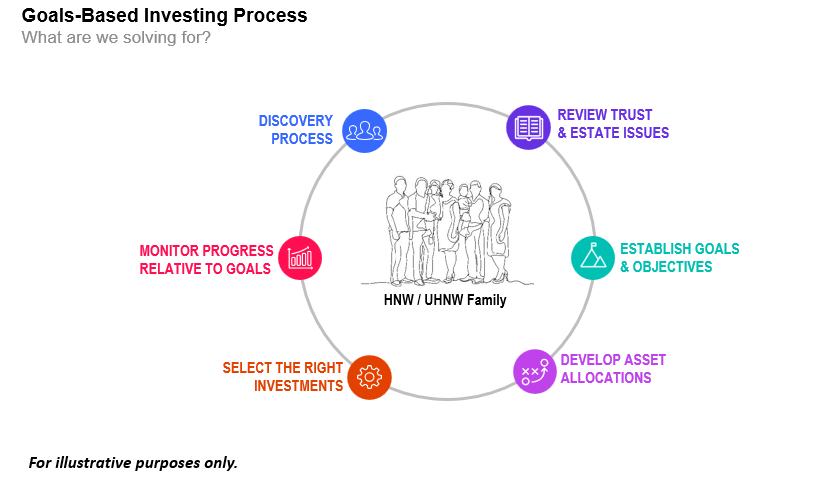In the latest episode of our Alternative Allocations podcast series, I discussed asset allocation and portfolio construction with Aaron Filbeck, Managing Director of the Chartered Alternative Investment Analyst Association (CAIA) and Head of UniFi by CAIA™. Aaron and I discussed the merits of advisors adopting a goals-based investing approach to align their portfolios with specific outcomes.
We talked about the need to communicate with clients in a more clear and concise fashion, and how framing the discussion based on what we are solving for is more constructive than falling into the trap of chasing returns. This approach also helps in establishing more realistic expectations and moves the discussion beyond trying to outperform the market.
The aim of asset allocation should be to allocate capital appropriately to improve a client’s chances of achieving their goals. High-net-worth families are often simultaneously solving for multiple goals, with different time horizons. Consequently, the families’ asset allocation may vary from one account type to the next (personal accounts, retirement accounts, trust accounts, etc.).
As Aaron stated, “They’re thinking about retirement or saving for college or trying to get through retirement or maybe multigenerational wealth. So, there are a lot of non-financial objectives and goals that clients are trying to accomplish.” He went on to encourage us to speak in terms that clients understand “. . . it’s important for us as a profession to speak that language a little bit more and try to translate this very technical and often complex field into something that’s a little bit more understandable for those clients and relate the portfolio to the purpose behind it.”
From a portfolio construction perspective, we discussed the need to carefully evaluate a fund, its liquidity provisions, underlying investments and risk-return tradeoffs. Aaron discussed product evolution, and the importance of considering the fund structure. “Fund structure and the ability to access some of these strategies has grown in terms of how you access them. It’s no longer a binary decision between a regulated mutual fund and a long lockup drawdown fund. There’s a lot of different flavors that are in between.”
With the dramatic changes in the alternative investment landscape, and the rapid product proliferation, we discussed the importance of advisor education, and the need to help clients make better informed decisions.
WHAT ARE THE RISKS?
All investments involve risks, including possible loss of principal. The value of investments can go down as well as up, and investors may not get back the full amount invested. Past performance does not guarantee future results.
Investments in many alternative investment strategies are complex and speculative, entail significant risk and should not be considered a complete investment program. Depending on the product invested in, an investment in alternative strategies may provide for only limited liquidity and is suitable only for persons who can afford to lose the entire amount of their investment. An investment strategy focused primarily on privately held companies presents certain challenges and involves incremental risks as opposed to investments in public companies, such as dealing with the lack of available information about these companies as well as their general lack of liquidity. Diversification does not guarantee a profit or protect against a loss.
Risks of investing in real estate investments include but are not limited to fluctuations in lease occupancy rates and operating expenses, variations in rental schedules, which in turn may be adversely affected by local, state, national or international economic conditions. Such conditions may be impacted by the supply and demand for real estate properties, zoning laws, rent control laws, real property taxes, the availability and costs of financing, and environmental laws. Furthermore, investments in real estate are also impacted by market disruptions caused by regional concerns, political upheaval, sovereign debt crises, and uninsured losses (generally from catastrophic events such as earthquakes, floods and wars). Investments in real estate related securities, such as asset-backed or mortgage-backed securities are subject to prepayment and extension risks.
An investment in private securities (such as private equity or private credit) or vehicles which invest in them, should be viewed as illiquid and may require a long-term commitment with no certainty of return. The value of and return on such investments will vary due to, among other things, changes in market rates of interest, general economic conditions, economic conditions in particular industries, the condition of financial markets and the financial condition of the issuers of the investments. There also can be no assurance that companies will list their securities on a securities exchange, as such, the lack of an established, liquid secondary market for some investments may have an adverse effect on the market value of those investments and on an investor’s ability to dispose of them at a favorable time or price.
IMPORTANT LEGAL INFORMATION
This material is intended to be of general interest only and should not be construed as individual investment advice or a recommendation or solicitation to buy, sell or hold any security or to adopt any investment strategy. It does not constitute legal or tax advice. This material may not be reproduced, distributed or published without prior written permission from Franklin Templeton.
The views expressed are those of the investment manager and the comments, opinions and analyses are rendered as at publication date and may change without notice. The underlying assumptions and these views are subject to change based on market and other conditions and may differ from other portfolio managers or of the firm as a whole. The information provided in this material is not intended as a complete analysis of every material fact regarding any country, region or market. There is no assurance that any prediction, projection or forecast on the economy, stock market, bond market or the economic trends of the markets will be realized. The value of investments and the income from them can go down as well as up and you may not get back the full amount that you invested. Past performance is not necessarily indicative nor a guarantee of future performance. All investments involve risks, including possible loss of principal.
Any research and analysis contained in this material has been procured by Franklin Templeton for its own purposes and may be acted upon in that connection and, as such, is provided to you incidentally. Data from third party sources may have been used in the preparation of this material and Franklin Templeton (“FT”) has not independently verified, validated or audited such data. Although information has been obtained from sources that Franklin Templeton believes to be reliable, no guarantee can be given as to its accuracy and such information may be incomplete or condensed and may be subject to change at any time without notice. The mention of any individual securities should neither constitute nor be construed as a recommendation to purchase, hold or sell any securities, and the information provided regarding such individual securities (if any) is not a sufficient basis upon which to make an investment decision. FT accepts no liability whatsoever for any loss arising from use of this information and reliance upon the comments, opinions and analyses in the material is at the sole discretion of the user.
Products, services and information may not be available in all jurisdictions and are offered outside the U.S. by other FT affiliates and/or their distributors as local laws and regulation permits. Please consult your own financial professional or Franklin Templeton institutional contact for further information on availability of products and services in your jurisdiction.


